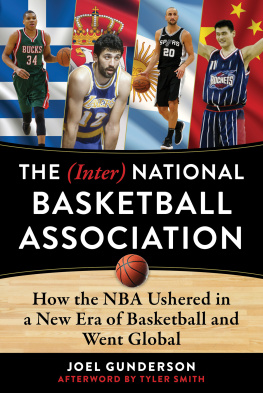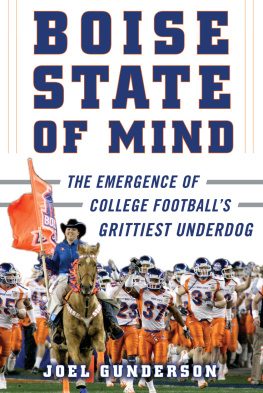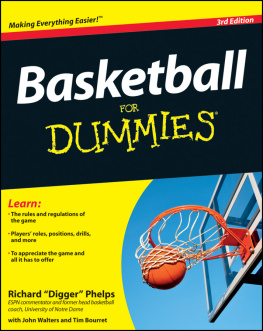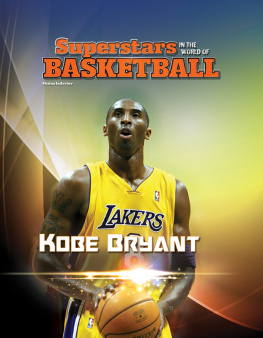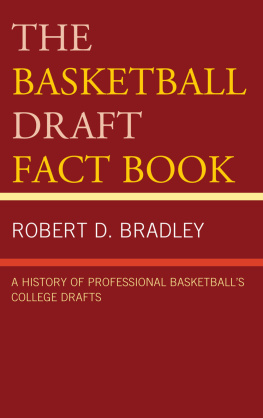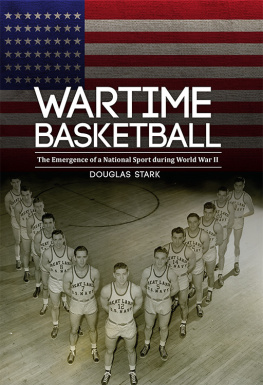


Copyright 2020 by Joel Gunderson
Afterword copyright 2020 by Tyler Smith
All rights reserved. No part of this book may be reproduced in any manner without the express written consent of the publisher, except in the case of brief excerpts in critical reviews or articles. All inquiries should be addressed to Sports Publishing, 307 West 36th Street, 11th Floor, New York, NY 10018.
Sports Publishing books may be purchased in bulk at special discounts for sales promotion, corporate gifts, fund-raising, or educational purposes. Special editions can also be created to specifications. For details, contact the Special Sales Department, Sports Publishing, 307 West 36th Street, 11th Floor, New York, NY 10018 or .
Sports Publishing is a registered trademark of Skyhorse Publishing, Inc., a Delaware corporation.
Visit our website at www.sportspubbooks.com.
10 9 8 7 6 5 4 3 2 1
Library of Congress Cataloging-in-Publication Data is available on file.
Cover design by Brian Peterson
Cover photo credits: Getty Images
Print ISBN: 978-1-68358-348-6
Ebook ISBN: 978-1-68358-349-3
Printed in the United States of America
Dedicated to my Grandma Schurr, who sat through hours of my retellings of Blazers games gone by.
Im sending a copy up to you in spirit.
CONTENTS
Preface
On the morning of January 26, 2020, I was sitting in our newly designed reading nook near the back of our house. My wife and I had recently converted it from our kids old playroom, which is a nice way of saying we converted it from an area most reminiscent to The Island of Misfit Toys.
After feeding the kids their breakfast and then cleaning up their peanut butter and jelly faces, I had settled into the chair nestled near the back window of the house, which overlooked our backyard, which itself bled into the neighborhood park. My wife was out with our oldest daughter, enjoying some mother-daughter time. And shopping, of course.
It was a rare sunny January day in Oregon; the unrelenting rain had slipped away, leaving behind flocks of chirping birds. The sounds of kids sprung free from the shackles of winter reverberated from the park. The shadows of the trees danced all around me, making the words on the pages of my book almost impossible to absorb, but entrancing all the same.
It was one of those perfect, tranquil days when you wonder why you ever let emotions get the best of you.
Between sips of coffee and unmet requests to my kids to keep their volume down, I was finding myself gazing outside more than normal. Perhaps it was the sun. Perhaps it was the post-run high that lingered; I was in that blissful moment in time before my dopamine levels settled back to reality. But for some reason, the moments were slowing more than usual, and I felt as if I was slowing down with it, absorbing the scene around more than I normally had.
The time was 1:07 p.m. PST.
When I flipped over my phone and pressed the home button, I instinctively pulled up Twitter. From there, my reactions came in waves, just like every other person around the globe, who was seeing the news as well.
Kobe Bryant was dead.
Over the course of the next hour or two, then three and four, as the news was absorbed, then disbelieved, then confirmed, I dove headfirst into the worlds reactions. What was striking mesomeone who had never met Kobe, not even in my time covering the NBA as a freelance reporterwasnt so much the outpouring from former teammates and rivals alike, but from people long removed from Kobe himself. Childhood schoolmates. Teammates from third grade. Teachers who recalled the small child with the big smile and even bigger bubble of confidence. Neighbors from the countries and cities Kobe had called home during his life: Italy, Philadelphia, and Los Angeles.
Kobe was very serious and very professional. Even when he was ten or eleven years old, he had the Mamba mentality, said childhood friend and former teammate Davide Giudici, referring to the phrase Bryant coined to describe his winning attitude. I was shocked, totally shocked. My first thought is about his family, his wife, sisters, his daughters. I was very sad thinking about Kobe at that moment.
Kobes global presence had been felt since his star took off in the mid-1990s, but his upbringing in Italyhe moved to Rieti in 1984 when his father, Joe Jellybean Bryant, signed with the AMG Sebastiani Rietiwas always at the root of who he was as a person. His on-court presence was Black Mamba, a man driven to rip your soul out in the most painful manner. His off-court demeanor, however, was all Italy.
Family. Giving. Gregarious. Loud.
Italy.

I grew up a stones throw from Portland, Oregon, now the lone professional basketball franchise in the Pacific Northwest. From the first breaths my body drew in this world, I was enamored with the Portland Trail Blazers. They absorbed me; to this day, its clutches have never fully let go. As life moves onward, Ive grown up (as people do). Ive gotten married, had three kids, and accumulated hobbies and responsibilities (as people also do). But the passion for my first love never left. When the Blazers are playing, and I can steal a moment or two, Im watching. When I have a break at work, Im scouring the Internet for any newsgood or badthat pertains to them.
When youre young and impressionableand, perhaps most, emotionalits easy to take things personal that have no business of being that way.
When it came to my childhood Blazers fandom, I, of course, worshipped the players who donned our uniforms. Clyde Drexler. Terry Porter. Jerome Kersey. Perhaps most of all, because of the headband (back when it was still unusual), Cliff Uncle Cliffy Robinson. These men towered over me both in height and stature. But outside of Portland, those who wore jerseys that I disagreed with became my enemies; men sent to destroy my teams destiny. Two men stuck out most. The first was the immortalized-but-hated-in-my-house Michael Jordan. The 1992 NBA Finals cemented that.
But the second? That was Kobe Bryant.
As my early years came and went, I often felt like the only kid my age who looked at Michael Jordan, the living embodiment of perfection and worship to most, and despised him. I despised him for everything he did to my team; for everything he did to your team, too, but I didnt mind that as much. But too often he crushed the spirit of my team.
I cried crocodile tears when he shrugged after hitting yet another three-pointer in the 1992 NBA Finals. Then, I cried tears of joy when he retired a year later. I was elated then, five years after that, when he hung them up for the second time. By the time he returned in the blue and white of the Washington Wizards, still dangerous but hardly the liquidator he had been years prior, a new enemy had arrived.
Jordan was irrelevant by then, an old man in an ambiguous franchise, far removed from my concerns.
The new enemy, though?
He was new. He was fresh. He was just as confident as Jordan had been in his prime. He was just as strong-willed in his desire to be the best as Jordan had been.
Next page
